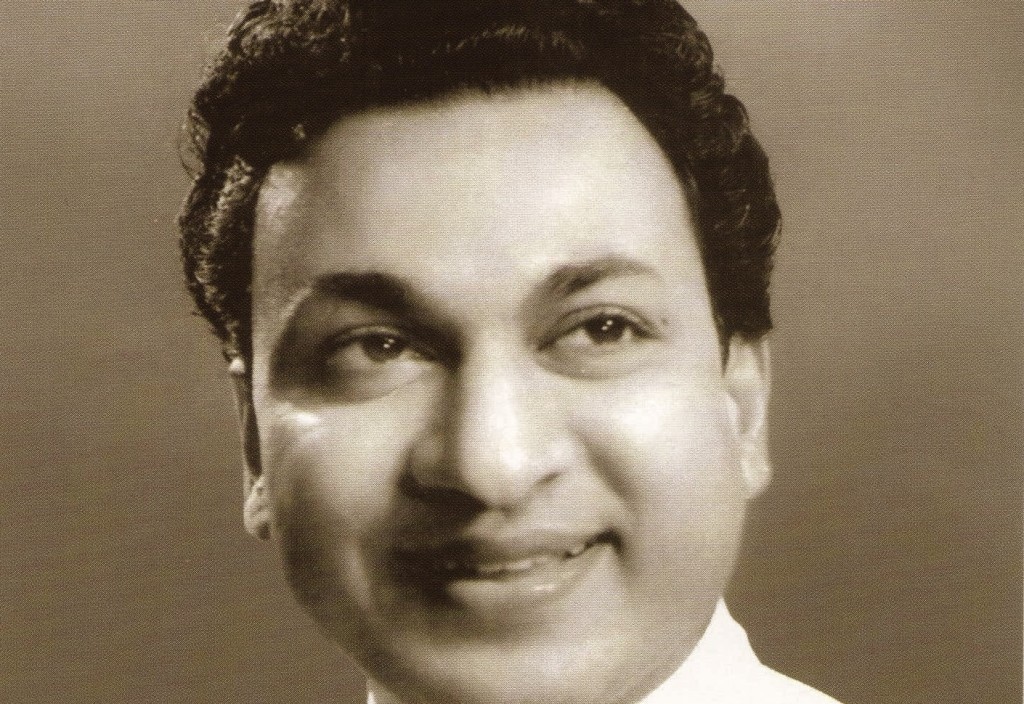Like MG Ramachandran (MGR) and Sivaji Ganesan in Tamil Cinema, NT Rama Rao (NTR) and A Nageshwara Rao in Telugu Cinema, and Prem Nazir in Malayalam filmdom, Rajkumar was the undisputed superstar of Kannada Cinema.
Rajkumar was born Mutturaj Singanalluru Puttaswamayya on April 24, 1929 in Gajanur, Karnataka. His father was his mentor. He began learning singing from the age of two and was given training in acting for the stage. He was initially a child actor for Veerana, regarded as the founder of the Kannada Stage as well as Film Industries, playing Arjuna in the stage spectacular Kurukshetra. He broke through in the theater world playing Narada in Bhukalidas repeating the role in the film of the same name.
Bedara Kannappa (1954) saw Rajkumar make his screen debut as a leading man opposite Pandari Bai. It is said he was spotted by the veteran director HLN Simha at a bus depot and signed as hero for the film! It was also Simha gave him his screen name. The film also marked the debut of GV Iyer as scriptwriter and looked at Rajkumar and Pandari Bai as gods banished to earth where they are born to a tribe of hunters and weather all the tests the gods impose on them.
Perhaps Rajkumar’s most famous film was Randheera Kanteerava (1960). This epochal historical is the prototype of many of Rajkumar’s costume epics. The film uses Mysore royalty’s intrigues to address Kannada national chauvinism. In fact, Rajkumar’s image, mainly moulded by GV Iyer was used as a quest for Karnataka’s cultural glory. The bulk of Rajkumarâ’s historicals and mythologicals were geared towards a populist version of Karnataka’s history. In these films his characters go through the narrative towards the final assertion of truth, inevitably built around soliloquies expressing moral dilemmas redolent with political wish-fulfillment. Later on this idiom was expanded from the historical and mythological films into the contemporary as well with films like Bangarada Manushya (1972), one of the top grossers of Kannada Cinema. He also made a particular strong pairing with actress, Bharathi.
https://www.youtube.com/watch?v=c-00_DSaQSE
Though known mainly for his historicals and mythologicals, Rajkumar was a versatile actor who brought credibility to all sorts of roles he essayed be it as mentioned the historicals and mythologicals or whether it be contemporary melodrama (Karulina Kare (1970)) or even James Bond like thrillers (Goadalli CID 999 (1968)). Needless to say, he excelled in all of them expertly modulating and varying his performances as required. And while his acting prowess singled Rajkumar out as an actor par excellence, his voice as a playback singer in Sampathige Saval (1974) propelled him into the bracket of an ace singer-actor, even winning a National Award as the best singer for the classical rendition of the song Naadamaya ee Lokavella in the film Jeevana Chaitra (1992).
Rajkumar substantially began to cut down his workload in the mid 1980s and retired more or less from acting and became a producer to promote his sons as leading men in Kannada films. With his superstardom, Rajkumar could easily have expanded his pastures trying Tamil or Telugu films (he was more than proficient in Tamil) which were bigger Industries than the Kannada Film Industry or even Hindi films but Rajkumar, a strong advocate of Karnataka, confined himself to the Kannada film world only. And unlike MGR or NTR, he stayed away from politics though offers were aplenty. Being a champion of the state language, he did however take active part in the Gokak agitation in the early 1980s, seeking primacy for Kannada. Along with his films, it was this affinity for Kannadigas that gave him demi-god status among the people of Karnataka stirring up mass hysteria when forest brigand Veerappan kidnapped him in 2000. His release was met with state-wide celebration with thanksgiving and prayers!
Rajkumar deservedly won several Awards and Laurels in his lifetime. He was honoured with the Padma Bushan, won 9 State Awards and 10 Filmfare Awards for Best Actor, a National Award for Best Singer besides. of course, the Dada Saheb Phalke Award for his contribution to Indian Cinema. Shyama Sundar Kulkarni published a monograph Dr. Rajkumar (1988) and P Lankesh edited a special Issue of Lankesh Patrike, Innuru Chitragala Raj (1988), dedicated to him. He was also given an Honorary Doctorate by Mysore University.
Rajkumar passed away in Bangalore due to a cardiac arrest on April 12, 2006. His popularity can be gauged from the fact that his death saw a total shutdown in Bangalore and there were riots in the city as fans, unable to catch a glimpse of his body as it lay in state, went on the rampage. With Rajkumar’s death, it was clearly the end of era for Kannada Cinema.


